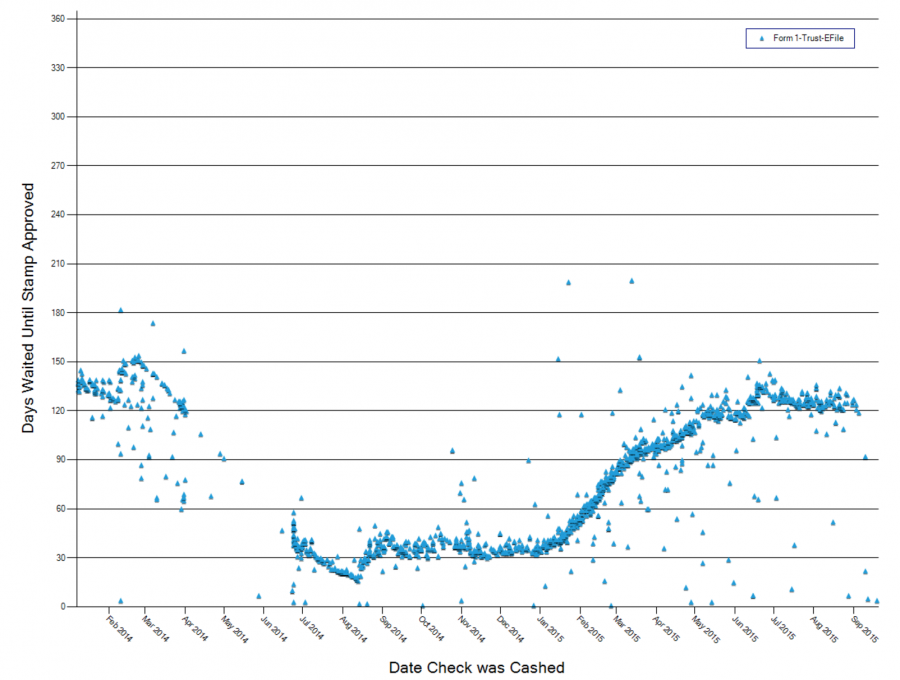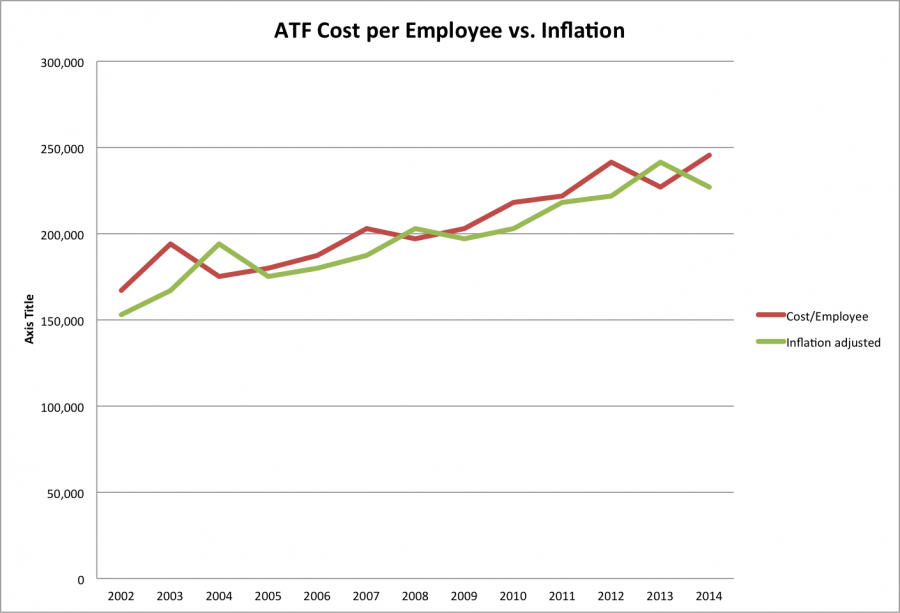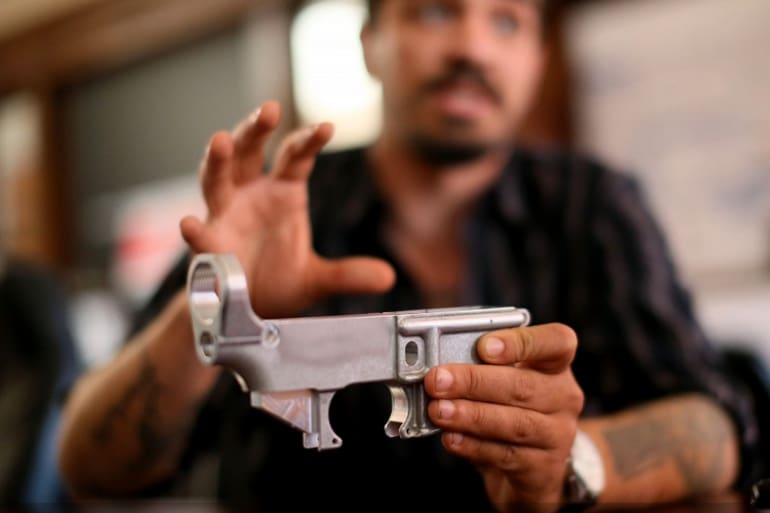
Consider the Bureau of Alcohol, Tobacco, Firearms and Explosives. Relative to the monstrous monolith that is the federal government, the $1.8b per annum ATF is fairly small fry. Even if Congress grants the President’s request to swell its budget with some 200 more full-time agents, the ATF will remain the small but powerful bane of the gun enthusiast’s existence. Take the process mandated under the National Firearm Act that Americans must use to register certain types of firearms and firearm accessories before taking ownership. It SUUUUUCCCKKKKKSSSSSSS . . .
Something as simple as registering a lower receiver as a short-barreled rifle can take up to four months (if you’re lucky). According to the graph from NFA Tracker above, it’s been that way for roughly eight months. For the better part of the last year, if you submitted $200 and a bunch of paperwork to the ATF electronically, it would take at least a month or more before you got your permission slip to do something so egregious as put a 14.5″ barrel without a pinned muzzle device on the lower receiver of your AR 15. The horror.
Given that I consider the NFA branch of the ATF to be the only one that actually runs like a business – as evidenced by the fact that I gave them money and they gave me a good or service in return – I thought it might be fun to compare them to Home Depot.
The reason that I chose Home Depot: they also offer a similar “Buy Online, Pick Up In Store” service. I go online and give Home Depot some amount of money. Later that day, usually within two hours or so, I pick up my items. Rarely does this process fail me. And when it does, I lose, at most, a few hours beyond the two I planned on. And my HD seems to be pretty good at resolving customer concerns when the process doesn’t work so well.
According to their website, the NFA branch processed 1,383,677 firearms last year. A sizable portion of those are surely double-counted; a manufacturer has to get them into the ATF’s NFA registry, transfer them to a dealer, and then a dealer has to transfer them to you.
The more relevant stat: 236,290. That’s the number of NFA forms the ATF processed in 2014. Assuming that each one of those is a Form 1 or Form 4 at $200 per form, that represents $47,258,000 in taxes collected. Truth be told, the number is quite a bit less given that some of them are likely forms that aren’t Form 1 or Form 4. Furthermore, it is very likely that some of them are forms where the applicant is rejected. But could we call it $30 million and feel comfortable? Sure!
I had a hell of a time figuring out how many ATF employees work in the NFA department producing that revenue stream. The ATF’s 2015 annual budget was $1,201,004,000, spread out among 4,803 employees. That’s a rather impressive $245,471 per employee. In case you’re curious, Home Depot’s annual cost per employee is a hair under $196K. After about ten seconds of thought, I also realized that the NFA branch is probably the only branch of the ATF that’s actually driving revenue. Everything else is a cost center. A big one.

The ATF is pretty decent at publishing the top line numbers, specifically around number of employees and entire budget. I plugged that data into Excel with a normalized line that you can see in green. The red line corresponds to the actual cost per employee. The green line corresponds to the cost of an employee in 2002 adjusted for inflation throughout the years.
The good news is that the two lines haven’t strayed too radically; the cost of the ATF on a per employee basis hasn’t grown significantly. I won’t even bother to show revenue per employee but imagine a small stack of peanuts if you need a visual.
What is concerning — strictly from a business operations standpoint – – is that the ATF hasn’t doubled down on the NFA branch. Which goes back to that whole motivation thing. Competition in markets. You know the drill.
So does Home Depot. They’re well aware that Lowe’s offers a very similar buy online, pick-up in store service. If I get too frustrated, I’ll likely take my money elsewhere. This will reduce their revenue per employee ever so slightly. But if enough people do it, it will make a big difference. Home Depot does not also have the luxury of an armed staff backed by a court system that can “motivate” me into using their products. So they have to, you know, earn it.
I don’t have anything against the people working the NFA branch of the ATF specifically. In my limited interactions, I’ve found them to be polite and professional. These are not the people responsible for Brian Terry’s death.
That said, they work for an organization that either a) doesn’t understand how business works or b) doesn’t care. Beyond a congressional mandate that all paperwork must be signed off on within 30 days (shall issue), there’s zero motivation for the ATF to do anything but keep the wait times under a year — as that seems to be the threshold when the proletariat starts to really make some noise.
In closing, imagine a scenario where you give Home Depot several hundred dollars for an item and then four months later they tell you that you can pick up your item. They’d be out of business within a few weeks. As the ATF has no competition, and all the funds from the NFA branch roll up to the general fund, short of a shall-issue congressional mandate, these sorts of shenanigans aren’t likely to change. Call your Congresscritter anyway.




While the John Lennon song is now in my head, just imagine if they had a half dozen competitors. Like the USPS does.
“I’d like next day express please”
Imagine they owned up to the fact that, even given 100% compliance:
1)their honor system doesn’t protect you at the individual level
2) it is entirely reactionary [after the fact] as to its protections
3) is a form of ‘throttling’ of gun ownership
4) is de facto gun/gun-owner registration for government’s sake
5) REGARDLES OF WHO THEY ARE OR HOW NICE THEY MAY BE, the ATF, [AND YOUR GOVERNMENT] is entirely comprised of your a-hole neighbors needing jobs, and if they want to prevent you from preventing them from oppressing you, they now merely need to run for office, and appoint their friends there,
This. Especially #s 3-5. I could not in good conscience work for BAFTE, and no one who works for that agency is welcome in my social circle.
The government isn’t in business to make money. So while it’s popular and occasionally useful to compare them to a business or analyse various parts using business metrics, you need to keep in mind that fundamentally it will be an analysis based on a false assumption.
You’re absolutely correct, but it’s still useful to do the comparison from a “we can do better for the money” perspective.
Right. It’s also useful in answering the question of whether the government should be doing this at all.
Although, as Mark pointed out, the inefficiency of the NFA regulation scheme isn’t a bug, it’s a feature; the whole thing was designed to make sure most people couldn’t afford the tax in the first place.
Adjusted for inflation that $200 tax in 1936(?) would be $3,400 today.
I agree. The purpose of the stamp tax was not and is not an attempt to create a revenue stream but instead to reduce demand for products subject to the NFA, in particular machine guns. As I recall, the tax was originally approximately the same as the cost of a Thompson submachinegun or a BAR, which, in addition to the background check, was to deter purchase of such firearms by gang members/ bank robbers.
It’s not false, but you are correct it’s not apples to apples, but that does not make it an invalid comparison. This is the exact point the author of this post is driving at – pointing at the dichotomy of a business as compared to a state agency.
Also of note, we know what motivates a business. The motivating force in a state agency is simply this; to remain. This means that fast turnaround times and efficiency work against the goal – to remain in place. The state agency is effectively rewarded for being inefficient.
We should seek at all levels to reign in state power, and anything at all that can be done by private enterprise should be. Fully 60 to 70% of the state should be fired today, we as a civil society would not just be ‘OK’, we would thrive. Sure that means 60 to 70% of the state employees would be out of jobs… I can live with that.
Easy to do? No. The journey of a thousand miles starts with one step of course.
A quarter mil. per employee? Wow…
Of which the employee will get less than half in salary. The rest goes to benefits and overhead.
it goes entirely into the general fund, and the atf sees none of it…
“a) doesn’t understand how business works or b) doesn’t care.”
Embrace the healing power of “and.”
I was to post answer B…however yours is much better. I too embrace the healing power of “and”.
“or” includes “and”.
Only for those of us who understand boolean logic.
Normal usage doesn’t correspond to Boolean operators.
In the case of “or” specifically, the linguistic version corresponds to logical “exclusive or”. In normal conversation, when people say “A or B”, they mean “either A or B, but not both”. Learning to make those translations is a big part of learning logic.
I work for the government. I can assure you it’s both A and B.
They have no reason to care, and they have no reason to know.
Tyler, the ATF does not care about your convenience. They don’t care about efficiency either. This is the nature of government jobs. They don’t get fired – if things become too inefficient / they just raise taxes on the populous and dump that money on the lax ATF employees so they can hire more people underneath them to do the job they don’t want to do.
I get the feeling that the folks at the NFA branch are getting a much higher number of requests per employee than Home Depot’s. Home Depot also isn’t getting paper requests mailed to them like the NFA branch is. Hopefully now that CLEO sign-off won’t be needed for those not using a trust, they can open up the e-file system for individuals to use as well and the whole process will speed up.
Given that fingerprints are still required, I’m not sure how eForms can remain active for Form 1, 4 and 5 after implementation of this ruling. Unless you go to one of the very few approved electronic fingerprint locations.
Good point.
The recent 41p ruling provide calendar year 2014 stats for Form 1 and Form 4 [page 224]:
In CY 2014, ATF processed 115,829 applications from trusts and legal entities and 29,191 application from individuals.
That’s all of the Form 1 and Form 4s – for a total of 145,020 applications, right around $30m. Remember, there are only a handful of official examiners.
I’m curious about the 30 day shall issue requirement. Can you provide a reference?
Also, you might consider a separate, but similar organization within the government which processes items (similar to NFA) for a fee: The State Department and Passports. Cost is about the same, the wait time is no-where near the same (2-6 weeks, usually), and you can get expedited service (for an additional fee). I also suspect that the State Department handles a few more than 150k passports per year.
Of course, a passport isn’t nearly as dangerous an item as an NFA Item (/sarc)
The National Firearms Act is a revenue bill, so if fedgov doesn’t turn a substantial profit by administering it, perhaps it should just be repealed?
No, if they opened this they would just increase the tax to $4,000.
“Home Depot’s annual cost per employee is a hair under $196K.”
Please.
If you’re going to compare government to a for-profit business, at least pick an example from the service sector, where they aren’t actually moving a physical product.
I don’t know where you got that number, or whether or not it includes Cost of Sales (the cost of buying products wholesale). But aside from that, Home Depot has stores and warehouses. Trucks. Forklifts. They have the huge infrastructure needed to move tons of physical product.
In the service sector, outside of heath care or law firms, the cost per employee is going to be much, much lower than that.
I picked home depot because the original version of this editorial was based on my sub par experience buying online and picking up in store, a theme I riffed on re: the ATF and the Form 1 process. It was revised heavily so you didn’t throw up your hands 20 minutes through while screaming, “What the hell is this guy rambling about?”
I collected the data from here: http://finance.yahoo.com/q/is?s=HD+Income+Statement&annual
I added together cost of revenue, selling G&A, and others and split it by the number of employees that HD reports.
Cost of revenue = cost of sales. What they pay to buy inventory for resale. It’s about 75% of what you added up.
In a typical law enforcement agency, 85% to 90% of the budget is personnel.
And guess what… despite that, the ATF spends more per employee!
Your (NFA) tax dollars at work.
Question: How many employees work in the NFA branch? How many are supervisory/management that don’t process applications? Knowing that, how many requests are handled by each employee per year? That would be relevant information.
Tyler, a substantial portion of the people working at the NFA branch are contractors. They are not employees and would not be included on any official head count. Just an FYI.
As an O7 / Class 2 SOT, I can tell you that the contractors are very good.
You did get very close to hitting the nail on the head, when you mentioned HD’s position in a competitive market.
The next step would have been to state that the ATF and Government in general is a monopoly enforced under threat of death using people and equipment that you paid for. They have no motivation to do better.
Its not like you can go to the other ATF and get the form done better/cheaper/faster.
Don
I’m no lawyer by any stretch of the imagination, but is there not a law somewhere mentioning a ban on monopolies? If the NFA branch, and the ATF are using tax dollars as business funds, couldn’t there be some legal repeal on them based on such a monopoly law? Just spit-balling here, maybe if such a thing exists, someone with better legal know how could get something rolling.
Where does ATF count the money brought in from asset forfeiture?
This is something I’ve noticed about the CFP (Canadian Firearms Program) as well…. The non-LEO functionaries who take calls/answer questions, track down where your stuff is in the process queue etc, are generally extremely helpful and very nice people; as soon as you get on the phone with a LEO (for investigating/approving applications,transfers, authorizations to transport etc)… well lets just say they are pretty close to useless and extremely rude, many also have a thinly veiled power trip going on too (for instance, acting like they are doing you a HUGE favor by getting things done whenever they feel like it).
Home Depot was a bad comparison. Should’ve gone with Barnes & Noble. After all, it’s faster, easier and cheaper to buy a gun in some places than to buy a book. Because LOOK AT THIS BABY!!!
How about they start a rule that is similar to when a person fills out a 4473 to purchase a firearm and they are wait listed. I may be wrong, but my understanding is that the FBI has three days to approve or deny and if no response is provided to the FFL at that the FFL dealer may proceed with the purchase. How about the NFA is given a time frame, be it a week or a month, but something reasonable for the consumer. If no response is provided within the allotted time frame, then the transfer is able to legally occur. After all, even though these are class III items, like firearms, it is within our rights that we are legally able to purchase and own them. Where the F is the damn NRA in fighting for these rights?
Could this be a class action law suit? Could the argument be made that in this decade of information technology, the ATF is failing in their responsibility and duty in an intentional manner?. It took less than 2 weeks to get my concealed carry license. Why does it take 6 months to a year to get approval for a suppressor. Should this be a congressional investigation? Just my .23 cents worth, (adjusted for inflation).
I inferred from the title that you were debating whether to procure your NFA components from pieces you obtained at the Home Despot, instead of going through the NFA process.
Comments are closed.